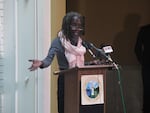Kiana has been scouting for a police officer willing to talk with her since the protests began.
On her third day of protesting, she set her eyes on an officer positioned just north of the Multnomah County Justice Center. The officer was stationed behind the fence, a structure now so symbolic in the demonstrations between police and protesters it has its own Twitter page.
Kiana stood pressed against the fence, pink swim goggles pulled up to her forehead and black face mask pulled down on her chin, pleading with the officer to speak to her. She asked OPB to not use her last name, fearing retribution from her employer.

Police and protesters face one another through a chain link fence in downtown Portland the night of June 3, 2020.
Jonathan Levinson / OPB
That officer didn't come to the fence — though another one later did and gave her his business card. Had he agreed to talk, Kiana said, she'd want to ask why she, a black woman born and raised in Portland, was pulled over so much more frequently than white drivers in her city.
Over the years, Kiana said, she’s been stopped because police said her windows were tinted and her car looked like that of a suspect. She said she’s currently fighting one of her tickets in court after an officer gave her a $265 fine for refusal to verify she had contacts in her eyes.
“I was being racially profiled, and he used the system,” she said. “But see I know the system. That little book he has in his pocket? The ORS? I’ve read the whole thing.”
What would it take to change policing in Portland?
Kiana, who has a degree in criminal justice, has not only read the Oregon Revised Statutes, the state's laws, but she has plenty of ideas on what concrete steps the city should take to curb police violence in Oregon.
She throws out a few: improved cultural awareness training for police; more officers recruited locally instead of from out of town; ending the Police Bureau’s Gun Violence Reduction Team, formerly called the Gang Enforcement Team.
That team was found to disproportionately pull over African Americans. A 2018 audit found 59 percent of drivers pulled over by the unit were Black, even though, at the time, just 6 percent of Portland residents of driving age were Black.
Until she sees elected leaders step up to meet some of these demands, Kiana said she’s staying in the streets.
“This is going to become a routine,” she said. “I’m going to be protesting every single day until there’s some changes.”
As protesters continue to demand justice for George Floyd in communities across the country, residents, activists, and public officials hope to harness the moment to enact reforms Portlanders have been pushing for for years.
Related: Under Pressure, Portland Will Eliminate School Resource Officer Program
In the past week, calls have mounted for the city to defund some of its police specialty units, which many in the community feel disproportionately target people of color.
Portland City Commissioner Jo Ann Hardesty announced she would be asking City Council to defund the gun violence reduction team, along with the Portland police who serve as law enforcement for TriMet and school resource officers — armed police officers in schools — before the vote on the budget in two weeks.
A day after Hardesty made that announcement, leaders in local school districts called for officers to leave school campuses, and Portland Mayor Ted Wheeler announced he would end that program.
Hardesty has long called for an end to those three units. But, knowing she didn’t have the votes to eliminate their funding during this spring’s budget session, she had agreed to team up with Wheeler to consider their “ongoing use.” She said they’d bring recommendations to the council by next February.
Leaders say protests could spur faster change
With thousands flooding into the streets each night demanding change, Hardesty may have the leverage to act now.

Portland Commissioner Jo Ann Hardesty on Nov. 14, 2019, at Portland City Hall.
Meerah Powell/OPB
“I’m a child of the '60s. I see what’s happening out on the streets, all over the world, right," she said. "I’m thinking, why do I have to wait until February, right? The people have said they want it now.”
This week, Hardesty also said she’ll be pushing for more training of the Portland police, a call echoed by protesters out on the streets each night.
While the demonstrations that take over Portland’s streets each night are officially leaderless, there is a small group of organizers often found at the front of the marches carrying bullhorns and starting chants.
Darren Golden, a policy specialist at the Urban League of Portland, is often among those at the front. Golden said advocates are currently hammering out demands they can hand over to elected leaders. Broadly, Golden said, he is interested in seeing major changes made to how Portland officers are disciplined and trained.
“We don’t have a way to get rid of officers who are racially biased or who have hate in their hearts focused on a protected class,” he said.
Trayci Lomax, 32, has been attending protests regularly with her mother. When she’s not downtown, she said, she’s been monitoring the gatherings on social media or listening to the radio.
Unlike some protesters, she’s not calling for total defunding of the police. But she is pushing for a fundamental shift in the way officers are trained.
“If a doctor has to go to school and universities for so many years to prove that they have the qualifications to save someone's life, why shouldn't the officer have to have the same qualifications?” Lomax asked. “They should take a test to make sure they’re not racist.”
Change could come in contract talks
As calls for change grow louder, activists and leaders are focusing on the city’s contract with the Portland Police Association, the union for rank-and-file police officers.
The contract was supposed to expire at the end of the month. But the pandemic made it impossible to hold the public bargaining sessions the city had promised. City leaders say they’re now hoping to extend the current contract for a year.
It's possible nights of massive demonstrations could strengthen the city's position as its bargaining team enters talks. On "Think Out Loud," Hardesty highlighted what she found to be one of the most egregious parts of the contract: the embarrassment clause. This means, if the city wants to discipline an officer, they need to do it in a way that is "least likely to embarrass the officer before other officers of the public."
“What does that even mean?” she asked. “Whether they are embarrassed or not — nobody cares whether any other public employee is embarrassed. So why does only the police contract have an embarrassment clause? So that’s got to go.”
Efforts to increase police accountability could reach beyond Portland.
State lawmakers mull police reforms
State lawmakers are considering several bills that could have a big effect on policing in Oregon cities. One bill under consideration would require the Oregon Attorney General to oversee investigations and prosecute deadly police shootings, if there’s evidence to suggest wrongdoing.
Members of the People of Color Caucus said they’ll back legislation that aims to prevent fired police officers from getting their jobs back.
Sen. Lew Frederick, a Democrat who represents North and Northeast Portland, said the bill requires arbitrators to follow any discipline outlined in a police contract.
“It says, basically, an arbitrator cannot decide that yes a police officer was egregious, yes, they did something wrong, but they can’t say … they should be reinstated,” he said.
Related: Family Of Killed Portland Teen Testify About Police Brutality At City Council Meeting
A court filing in a lawsuit filed by the family of Quanice Hayes against the city notes the Portland Police Bureau has long struggled to discipline officers who use deadly force. Hayes was shot and killed by police in Feb. 2017.
The court document states that since the 1960s only one officer who used deadly force faced disciplinary actions that stuck. Others were promoted, returned to work and received back pay.
“The use of deadly force by members of the Portland Police Bureau has been a long-standing source of tension between the City and Portland’s African-American community,” the lawsuit states. “This tension has been aggravated by the City’s failure to hold officers accountable for the use of deadly force. The City has only effectively disciplined one officer for the actual use of deadly force."
The bills being proposed by the POC Caucus already have the backing of House Majority Leader Tina Kotek.
“Oregon has an opportunity to address abuses that have gone on for far too long,” the Democrat said in a statement. “We must rise to the challenge of this moment.”
Even police unions said they’re supportive of some changes, though they want to be part of crafting the legislation.
“As a profession we have to continually improve, and progress and grow and adapt,” said Dan Thenell, general counsel for the Oregon Lodge of the Fraternal Order of Police. “Change is inevitable. Reforms are inevitable. Reforms are needed. And we want to help make that workable.”
As it’s written, Thenell said, the arbitration bill could harm officers whose managers and departments are out to get them.
Across the country, protests continue to swell. Demonstrators in Portland have said they have no plans to stop anytime soon. As demands for change continue to grow, lawmakers and unions will be under pressure to make meaningful changes.